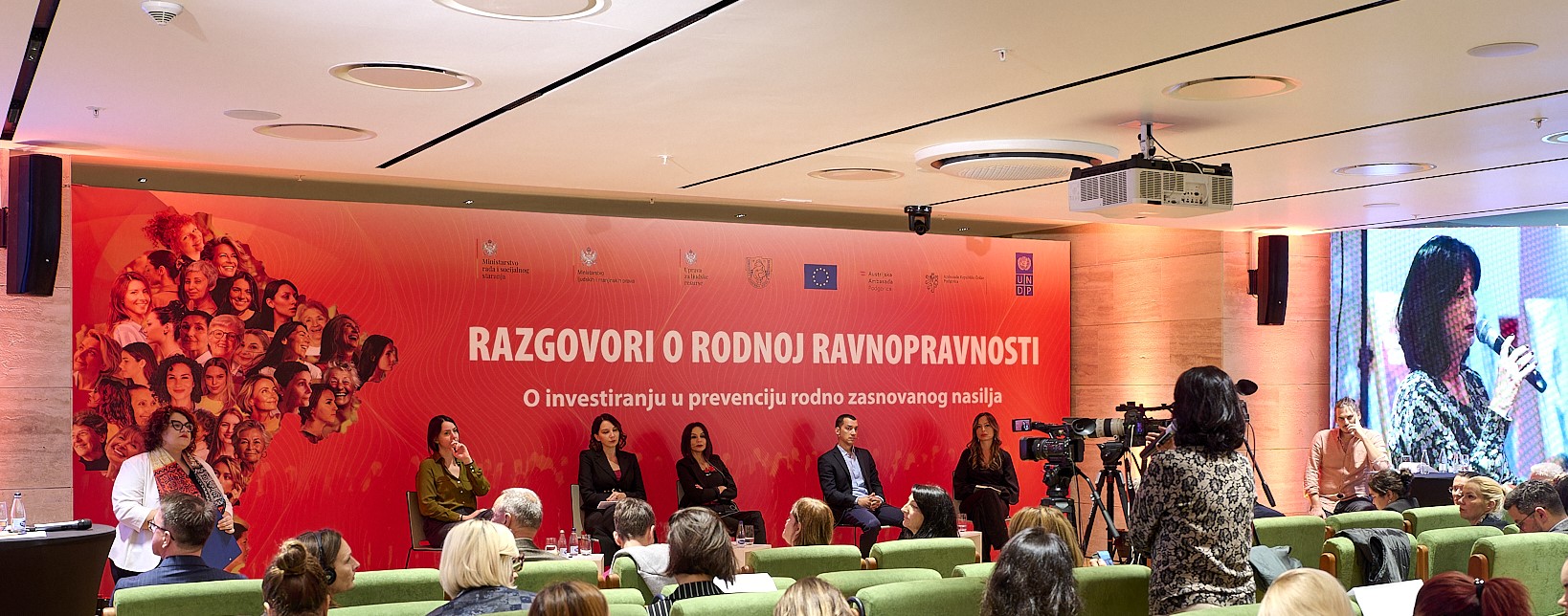16 Days of activism against gender-based violence campaign
The fight for gender equality more urgent than ever
November 24, 2023

Podgorica, 24 November, 2023 – The surge in gender-based hate speech and violence against women in online and public spaces, coupled with the strengthening of regressive processes, demonstrates that the fight for gender equality is more crucial than ever before. Furthermore, the fact that one in three women will experience some form of physical or sexual violence in their lifetime underscores the necessity for a collective response to violence from all segments of society.
This was conveyed during the first event within the “Gender Equality Talks” series, organized by UNDP in Montenegro as part of the global “16 Days of Activism Against Gender-Based Violence” campaign.
Discussions on investments in the prevention of gender-based violence brought together representatives from the Government of Montenegro, the academic community, media, non-governmental organizations, the diplomatic corps, as well as human rights activists, shedding light on various manifestations of regressive processes globally, which also impact Montenegro.
At the outset of the discussion, it was emphasized that the public discourse in Montenegrin society reflects deeply rooted patriarchal values through the normalization of gender stereotypes. Expectations regarding “masculine” and “feminine” behaviour are firmly ingrained in language, limiting the freedom of expression and action for individuals. Gender stereotypes pave the way for sexism in personal and professional spheres, and governmental bodies must be sensitive to cases of stereotyping, degradation, dehumanization, and trivialization of women, creating serious obstacles to the implementation of human rights.
In this context, the crucial role that the media plays in shaping social attitudes and perceptions was highlighted, emphasizing their responsibility for spreading hate speech but also acknowledging their potential as a powerful instrument in combating these phenomena.
It was emphasized that all forms of violence, from less visible to overt, stem from the same source – unequal access to power and resources between women and men, which is the focus of this year's campaign, “Investing in the prevention of gender-based violence”. This inequality persists as the most persistent pattern of inequality that we still live with today, originating from tradition and resisting attempts to influence it.
Panellists and human rights activists also addressed the very subtle manifestation of violence against women imposed through the contemporary phenomenon of social media consumerism. False beauty standards and toxic masculinity on social media often deepen gender inequality, making the creation of a safer virtual space crucial to supporting equality, respect, and freedom of expression for all. The experience of the Czech Republic demonstrated that the involvement of men in these processes is necessary, as achieving gender equality is not possible without the participation of both women and men.
An important topic was the role of women in building communities that encourage dialogue, reconciliation, and cooperation, emphasizing the importance of equal inclusion of women in peace processes. Their equal participation in these processes is crucial for creating sustainable policies and strategies that contribute to reducing violence in society. It was concluded that investing not only in a response to violence but also in the prevention of gender-based violence is crucial as a long-term strategy.
Conversations on gender equality have created a platform to illuminate all aspects of gender-based violence, changing awareness and contributing in the long run to stopping gender-based violence.
The following individuals participated in the event: Aneta Spaić, Dean of the Faculty of Law; Olivera Komar, Professor at the Faculty of Political Sciences; Jovana Radifković, Head of the Directorate for Gender-Based Violence; Balša Lubarda, Director of Research at the Damar Institute; Vera Damjanović, Gender Equality Trainer; Naida Nišić, Minister of Labor and Social Welfare; Karl Müller, Ambassador of Austria in Montenegro; Ekaterina Paniklova, UNDP Resident Representative in Montenegro; Duška Pejović, Journalist at RTCG; Marko Savić, Researcher; Biljana Pejović, Head of the Gender Equality Department; Milica Nikolić from the Human Resources Administration; Aida Petrović and Biljana Zeković, Women's Rights Activists; Sofija Kirsanov, Youth Activist; Danilo Marunović, Director and Human Rights Activist; and Marija Blagojević, Gender Equality Expert at UNDP.
The event was organized by UNDP in collaboration with the Embassies of Austria and the Czech Republic, the EU Delegation in Montenegro, the Ministry of Labor and Social Welfare, the Department for Gender Equality of the Ministry of Human and Minority Rights, and the Human Resources Administration, with the support of the "Promotion of dialogue and joint actions to combat hate speech", a project financed by UNDP Funding Window for Governance, Peacebuilding, Crisis and Resilience with contributions of Sweden and Luxembourg.
Gender equality talks continue on 30 November with an event dedicated to violence against women with disabilities, focusing on structural barriers.

 Locations
Locations

















